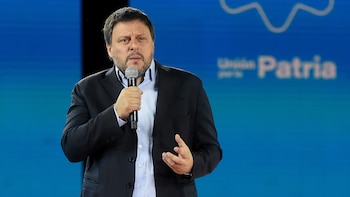
This Wednesday, March 23, the former president of Colombia and director of the Liberal Party, César Gaviria, announced that a dialogue with the Historical Pact was “unfeasible” and closed all possibility of union with the left-wing coalition ahead of the first presidential round to be held on May 29.
In a statement, the former president of this community, who won an important vote during the legislative elections, rejected the statements of the Afro-Colombian activist, Francia Márquez, who was announced this Wednesday morning as the vice-presidential formula of the opposition leader and candidate for the presidency of Colombia, Gustavo Petro.
“I am very sorry that the historical pact thinks that its incendiary language is something that we Colombians can celebrate. I hope that our country does not expect that language and attitude that will lead to more violence and total confrontation between its economic, social and political forces,” said the director of the Liberal Party.
However, the left-wing senator and candidate for the presidency of Colombia, Gustavo Petro, who leads the polls of intent to vote, told the former president with whom he had approached in recent days, in the face of the legislative and presidential elections, that a “liberal attitude will always be willing to accept criticism and to put the arguments instead of it”.
In turn, he pointed out that he did not seek to disqualify people when he recognized that Colombia needed a path of rectification, and he invited the ranks of the liberal party to make the country “a power of life”, leaving the door open to members of that bench and militants to support the political project of the Historical Pact.
“We recognize in César Gaviria the person in whom the Liberal Party has appointed its spokesperson. We hope that liberalism will prepare itself to the path of the reforms that Colombia needs. If liberalism wants to embrace fascism, we cannot prevent it, history will judge it harshly,” said the left-wing senator.
For his part, the senator and head of debate of the Historical Pact, Roy Barreras, pointed out that César Gaviria had been the manager of the 1991 Constitution “that the Historical Pact must defend” and who accompanied “without sprains” the Peace Agreement, pointing out that offending him was a mistake “I hope you understand that not the world has experience in building unity”.
“Very difficult like that. In relationships of this level you can't improvise. Applause from the excited gallery. Closed doors to build governance. To squander the efforts made to add and win in the first round is not a good idea. Even winning, you have to rule. The bridge is broken... what will we cure it with...”, said Congressman Barreras, who seems to puja Francia Márquez for his statements against the former president.
The statements that would have generated César Gaviria's resentment were mentioned by Francia Márquez during her presentation as the vice-presidential formula of the Historical Pact, noting that she had never denied the need to work with the community that obtained important results in the congressional elections.
“We always said: 'with the Liberal Party as such there is every openness to move forward'. Another thing I said was the problem with César Gaviria as a person. He represents neoliberalism, he represents more of the same and this country requires change,” said the candidate, who won the third largest vote within the coalitions in internal consultations, with almost 800,000 votes.
KEEP READING
Últimas Noticias
Debanhi Escobar: they secured the motel where she was found lifeless in a cistern
Members of the Specialized Prosecutor's Office in Nuevo León secured the Nueva Castilla Motel as part of the investigations into the case

The oldest person in the world died at the age of 119
Kane Tanaka lived in Japan. She was born six months earlier than George Orwell, the same year that the Wright brothers first flew, and Marie Curie became the first woman to win a Nobel Prize

Macabre find in CDMX: they left a body bagged and tied in a taxi
The body was left in the back seats of the car. It was covered with black bags and tied with industrial tape
The eagles of America will face Manchester City in a duel of legends. Here are the details
The top Mexican football champion will play a match with Pep Guardiola's squad in the Lone Star Cup

Why is it good to bring dogs out to know the world when they are puppies
A so-called protection against the spread of diseases threatens the integral development of dogs




